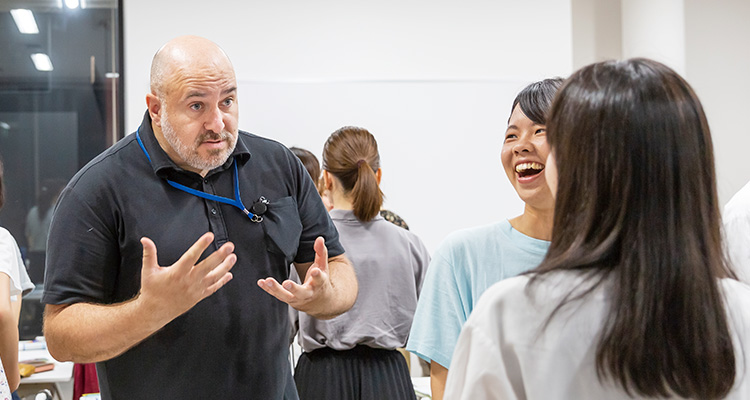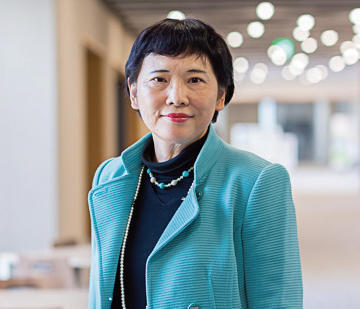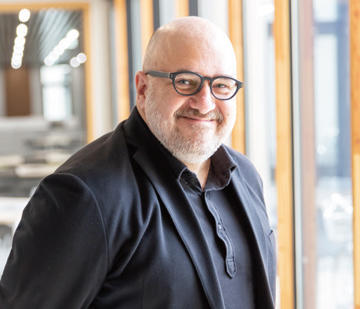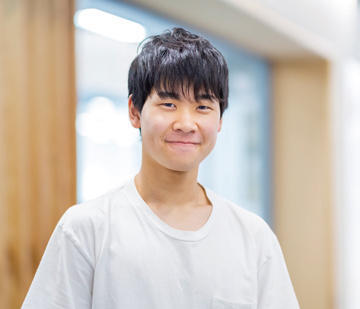English-language education (English Program for Global Mobility)
Developing practical English-language abilities in classes divided by level

The English Program for Global Mobility combines four skills: reading, listening, speaking, and writing. 1st year students attend four intensive classes per week to develop the ability to utilize English and communication skills in a balanced way. They master practical English skills and the ability to understand the main points when listening.
English Program for Global Mobility
| Quarter 1 | Quarter 2 | Quarter 3 | Quarter 4 | |
| 1st year | Foundations of English I |
Foundations of English II |
Comprehensive English I |
Comprehensive English II |
| Basic English Communication I |
Basic English Communication II |
Academic English Communication I |
Academic English Communication II |
|
| 2nd year | Comprehensive English III |
(Overseas Program) | Career English I | Career English II |
| Academic English Communication III |
Academic English for Global Mobility I |
Academic English for Global Mobility II |
Messages from teachers
The English Program for Global Mobility develops reliable English skills for rich communication

Junichi Saka, professor
The University of Nagano conducts courses to intensively improve English-language schools, called the “English Program for Global Mobility.” Students develop reliable English abilities through courses to develop accuracy (the ability to accurately use English) taught by Japanese teachers (twice per week), and courses to develop fluency (the ability to speak English without hesitation) taught by native English speakers (twice per week).
The University of Nagano conducts courses to intensively improve English-language schools, called the “English Program for Global Mobility.” Students develop reliable English abilities through courses to develop accuracy (the ability to accurately use English) taught by Japanese teachers (twice per week), and courses to develop fluency (the ability to speak English without hesitation) taught by native English speakers (twice per week).
Improving listening abilities helps students understand and speak in their own words

Hiroko Tomoda, professor
In my class, we do TOEIC listening practice as warmup exercises. Students who had TOEIC scores around 400 points at the time of admission improve their score by 150 to 200 points over one or two quarters. Some even see their scores rise by 300 or more points. We start with listening to what the other person is saying and practice becoming able to understand them and gradually expressing yourself in English. In this way, I hope to cultivate students who have a perspective that will allow them to confidently be active on the global stage and use English as a tool in the future.
In my class, we do TOEIC listening practice as warmup exercises. Students who had TOEIC scores around 400 points at the time of admission improve their score by 150 to 200 points over one or two quarters. Some even see their scores rise by 300 or more points. We start with listening to what the other person is saying and practice becoming able to understand them and gradually expressing yourself in English. In this way, I hope to cultivate students who have a perspective that will allow them to confidently be active on the global stage and use English as a tool in the future.
Learning both “accuracy” and “fluency”

Richard Jean-Pierre Joseph, lecturer
Learning English requires many things, including numerous vocabulary words and grammar points as well as assertiveness, perseverance, and ambition. Learning a second language is challenging, but many people are able to do this around the world. Studying both “accuracy” and “fluency” encourages students to take steps towards mastering great knowledge and abilities.
Learning English requires many things, including numerous vocabulary words and grammar points as well as assertiveness, perseverance, and ambition. Learning a second language is challenging, but many people are able to do this around the world. Studying both “accuracy” and “fluency” encourages students to take steps towards mastering great knowledge and abilities.
Comments from current students

Hiroki Kazui
3rd year, Department of Global Management Studies
We can ask bilingual teachers about things we don’t understand and hear about their experiences studying abroad. We also develop presentation abilities by practicing conversations.

Fumina Osawa
3rd year, Department of Global Management Studies
We speak English throughout the whole class. Students learn about the world and develop logical ways of thinking through presentations and discussions.

Taiga Gomi
2nd year, Department of Child Development and Education
There are many pair and group activities in which we cooperatively do assignments. We can directly learn about pronunciation and expressive skills from teachers who are native speakers.
